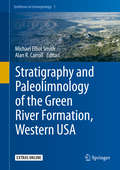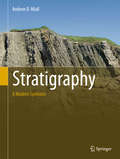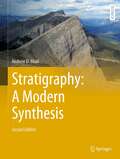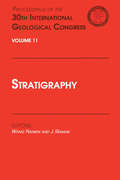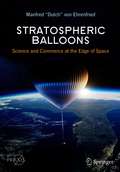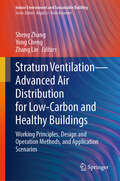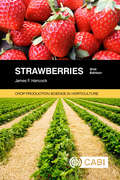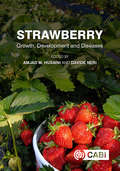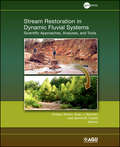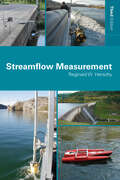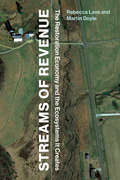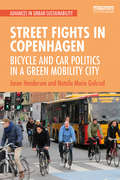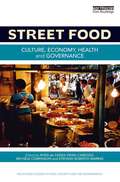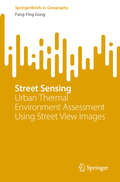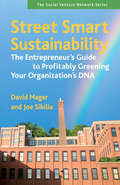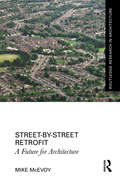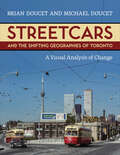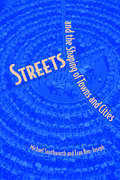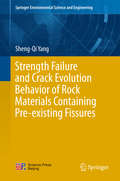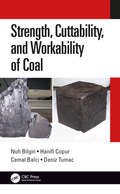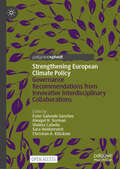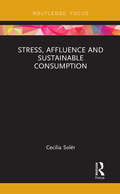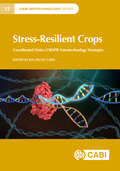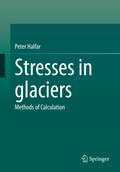- Table View
- List View
Stratigraphy and Paleolimnology of the Green River Formation, Western USA
by Alan R. Carroll Michael Elliot SmithThis volume presents a suite of detailed stratigraphic and sedimentologic investigations of the Eocene Green River Formation of Wyoming, Colorado and Utah, one of the world's foremost terrestrial archives of lacustrine and alluvial deposition during the warmest portion of the early Cenozoic. Its twelve chapters encompass the rich and varied record of lacustrine stratigraphy, sedimentology, geochronology, geochemistry and paleontology. Chapters 2-9 provide detailed member-scale synthesis of Green River Formation strata within the Greater Green River, Fossil, Piceance Creek and Uinta Basins, while its final two chapters address its enigmatic evaporite deposits and ichnofossils at broad, interbasinal scale.
Stratigraphy: A Modern Synthesis
by Andrew D. MiallA Comprehensive review of modern stratigraphic methods. The stratigraphic record is the major repository of information about the geological history of Earth, a record stretching back for nearly 4 billion years. Stratigraphic studies fill out our planet's plate-tectonic history with the details of paleogeography, past climates, and the record of evolution, and stratigraphy is at the heart of the effort to find and exploit fossil fuel resources. Modern stratigraphic methods are now able to provide insights into past geological events and processes on time scales with unprecedented accuracy and precision, and have added much to our understanding of global tectonic and climatic processes. It has taken 200 years and a modern revolution to bring all the necessary developments together to create the modern, dynamic science that this book sets out to describe. Stratigraphy now consists of a suite of integrated concepts and methods, several of which have considerable predictive and interpretive power. The new, integrated, dynamic science that Stratigraphy has become is now inseparable from what were its component parts, including sedimentology, chronostratigraphy, and the broader aspects of basin analysis.
Stratigraphy: A Modern Synthesis (Springer Textbooks in Earth Sciences, Geography and Environment)
by Andrew D. MiallThe updated textbook is intended to serve as an advanced and detailed treatment of the evolution of the subject of stratigraphy from its disparate beginnings as separate studies of sedimentology, lithostratigraphy, chronostratigraphy, etc., into a modern integrated discipline in which all components are necessary. There is a historical introduction, which now includes information about the timeline of the evolution of the components of modern stratigraphy. The elements of the various components (facies analysis, sequence stratigraphy, mapping methods, chronostratigraphic methods, etc.) are outlined, and a chapter discussing the modern synthesis is included near the end of the book, which closes with a discussion of future research trends in the study of time as preserved in the stratigraphic record.
Stratigraphy: Proceedings of the 30th International Geological Congress, Volume 11
by Wang NaiwenThis volume presents the proceedings of Symposium I "Stratigraphy" of the 30th International Geological Congress at Beijing. The proceedings aim to present a view of contemporary geology and should be of interest to researchers in the geological sciences.
Stratospheric Balloons: Science and Commerce at the Edge of Space (Springer Praxis Books)
by Manfred “Dutch” von EhrenfriedStratospheric balloons are powerful tools used to study the Earth and its atmosphere, as well as the greater cosmos beyond. This book describes the science and technology behind modern stratospheric ballooning, along with the surprising ways it has impacted our daily lives.The book takes you through every step of the process, starting with an in-depth introduction to basic balloon types and their uses before delving into balloon construction and mission planning. Along the way, you will learn about the novel technologies that have radically changed these balloons and their ability to launch, control and navigate them over specific ground targets. Next follows an exploration of their incredible applications, including research in atmospheric science, cosmology and astronomy, earth studies, meteorology, and aerobiology, and also commercial capabilities such as Internet networks and high-altitude tourism.The community of scientists, engineers, and entrepreneurs involved in stratospheric ballooning is only ever growing. This book shows you how these national and international efforts have truly soared in recent years, and it will be an enjoyable read for anybody interested in learning more about how science and commerce are conducted in the stratosphere, at the edge of space.
Stratum Ventilation—Advanced Air Distribution for Low-Carbon and Healthy Buildings: Working Principles, Design and Operation Methods, and Application Scenarios (Indoor Environment and Sustainable Building)
by Yong Cheng Sheng Zhang Zhang LinThis book investigates the creation of healthy and thermally comfortable built environments in a low-carbon manner with advanced air distribution, i.e., stratum ventilation. Stratum ventilation efficiently supplies conditioned and clean air to the head level of occupants for thermal comfort and inhaled air quality and largely reduces energy consumption and CO2 emission, e.g., by 44% and 32%, respectively, compared with the conventional air distribution method. This book provides the working principles, performance evaluations methods, design methods, operation methods, and different application scenarios (particularly highlighting airborne infection risk control of respiratory diseases and integrated application with renewable energy) of stratum ventilation, to provide theoretical understandings and technical guidelines of stratum ventilation. The book is intended for undergraduate and graduate students, researchers, and engineers who are interested in cutting-edge technologies of livable and sustainable built environments.
Strawberries (Crop Production Science in Horticulture)
by James HancockThis new and updated edition of a popular text provides a broad, balanced review of the scientific knowledge of strawberries and their cultivation. The worldwide strawberry industry has grown substantially since the original book was published, and methods of culture have undergone extensive modifications. This volume incorporates important changes to the taxonomy of strawberries and new understanding of how its ancestors evolved. It includes coverage of new disease and pest control methods and recent developments in genomic information. These advancements have greatly improved our understanding of how flowering and fruiting is regulated, and will revolutionize the breeding of strawberries. Drawing on extensive research and practical experience, the author presents an essential text that: Includes new content on genomic data, trait genetics, and marker-assisted strategies for varietal improvement. Provides a thorough review of the evolution of the strawberry and the history of strawberry cultivation. Contains an up-to-date comparison of the cultural systems employed across the world and the physiology behind these practices. Presented in full-colour throughout, this is a core guide for academic and professional researchers, breeders and growers, advisors, extension personnel and students of horticulture.
Strawberry
by Amjad M. Husaini Davide NeriMethods of strawberry cultivation have undergone extensive modification and this book provides an up-to-date, broad and balanced scientific review of current research and emerging challenges. Subjects covered range from plant propagation, architecture, genetic resources, breeding, abiotic stresses and climate change, to evolving diseases and their control. These topics are examined in three sections: - Genetics, Breeding and Omics - covering genetic resources, breeding, metabolomics, transcriptomics, and genetic transformation of strawberry. - Cultivation Systems and Propagation - discusses plant architecture, replanting problems and plant propagation techniques. - Disease and Stress Management - deals with traditional and emerging fungal diseases, their diagnosis and modern biocontrol strategies, and biotechnological interventions for dealing with the challenges of climate change. Strawberry: Growth, Development and Diseases is written by an international team of specialists, using figures and tables to make the subject comprehensible and informative. It is an essential resource for academics and industry workers involved in strawberry research and development, and all those interested in the commercial cultivation of strawberries.
Stream Restoration in Dynamic Fluvial Systems: Scientific Approaches, Analyses, and Tools
by Andrew Simon Sean J. Bennett Janine M. CastroPublished by the American Geophysical Union as part of the Geophysical Monograph Series, Volume 194.<P><P>Stream Restoration in Dynamic Fluvial Systems: Scientific Approaches, Analyses, and Tools brings together leading contributors in stream restoration science to provide comprehensive consideration of process-based approaches, tools, and applications of techniques useful for the implementation of sustainable restoration strategies. Stream restoration is a catchall term for modifications to streams and adjacent riparian zones undertaken to improve geomorphic and/or ecologic function, structure, and integrity of river corridors, and it has become a multibillion dollar industry.<P> A vigorous debate currently exists in research and professional communities regarding the approaches, applications, and tools most effective in designing, implementing, and assessing stream restoration strategies given a multitude of goals, objectives, stakeholders, and boundary conditions. More importantly, stream restoration as a research-oriented academic discipline is, at present, lagging stream restoration as a rapidly evolving, practitioner-centric endeavor. The volume addresses these main areas: concepts in stream restoration, river mechanics and the use of hydraulic structures, modeling in restoration design, ecology, ecologic indices, and habitat, geomorphic approaches to stream and watershed management, and sediment considerations in stream restoration. Stream Restoration in Dynamic Fluvial Systems will appeal to scholars, professionals, and government agency and institute researchers involved in examining river flow processes, river channel changes and improvements, watershed processes, and landscape systematics.
Streamflow Measurement
by Reginald W. Herschy�Too little water or too much'? In either case streamflow measurement is crucial. Climate change could significant affect water resources and flood management. Streamflow measurement is necessary for efficient water management.This third edition deals with all the main current methods for measuring the flow in rivers and open channels, in accordanc
Streams of Revenue: The Restoration Economy and the Ecosystems It Creates
by Rebecca Lave Martin DoyleAn analysis of stream mitigation banking and the challenges of implementing market-based approaches to environmental conservation.Market-based approaches to environmental conservation have been increasingly prevalent since the early 1990s. The goal of these markets is to reduce environmental harm not by preventing it, but by pricing it. A housing development on land threaded with streams, for example, can divert them into underground pipes if the developer pays to restore streams elsewhere. But does this increasingly common approach actually improve environmental well-being? In Streams of Revenue, Rebecca Lave and Martin Doyle answer this question by analyzing the history, implementation, and environmental outcomes of one of these markets: stream mitigation banking.
Street Fights in Copenhagen: Bicycle and Car Politics in a Green Mobility City (Advances in Urban Sustainability)
by Jason Henderson Natalie Marie GulsrudWith 29 percent of all trips made by bicycle, Copenhagen is considered a model of green transport. This book considers the underlying political conditions that enabled cycling to appeal to such a wide range of citizens in Copenhagen and asks how this can be replicated elsewhere. Despite Copenhagen’s global reputation, its success has been a result of a long political struggle and is far from completely secure. Car use in Denmark is increasing, including in Copenhagen's suburbs, and new developments in Copenhagen include more parking for cars. There is a political tension in Copenhagen over the spaces for cycling, the car, and public transit. In considering examples of backlashes and conflicts over street space in Copenhagen, this book argues that the kinds of debates happening in Copenhagen are very similar to the debates regularly occurring in cities throughout the world. This makes Copenhagen more, not less, comparable to many cities around the world, including cities in the United States. This book will appeal to upper-level undergraduates and graduates in urban geography, city planning, transportation, environmental studies, as well as transportation advocates, urban policy-makers, and anyone concerned about climate change and looking to identify paths forward in their own cities and localities.
Street Food: Culture, economy, health and governance (Routledge Studies in Food, Society and the Environment)
by Ryzia de Cassia Vieira Cardoso Stefano Roberto Marras MichPrepared foods, for sale in streets, squares or markets, are ubiquitous around the world and throughout history. This volume is one of the first to provide a comprehensive social science perspective on street food, illustrating its immense cultural diversity and economic significance, both in developing and developed countries. Key issues addressed include: policy, regulation and governance of street food and vendors; production and trade patterns ranging from informal subsistence to modern forms of enterprise; the key role played by female vendors; historical roots and cultural meanings of selling and eating food in the street; food safety and nutrition issues. Many chapters provide case studies from specific cities in different regions of the world. These include North America (Atlanta, Philadelphia, Portland, Toronto, Vancouver), Central and South America (Bogota, Buenos Aires, La Paz, Lima, Mexico City, Montevideo, Santiago, Salvador da Bahia), Asia (Bangkok, Dhaka, Penang), Africa (Accra, Abidjan, Bamako, Freetown, Mozambique) and Europe (Amsterdam).
Street Sensing: Urban Thermal Environment Assessment Using Street View Images (SpringerBriefs in Geography)
by Fang-Ying GongCombining publicly available Google Street View (GSV) images with deep learning and radiative transfer models enables researchers to assess urban physical and thermal environments, especially in high-density areas. This book introduces this advanced approach, which provides large-scale, high-accuracy, and high-density measurements of street-level urban features—key to understanding urban radiation balance and thermal dynamics.By leveraging GSV images, this method directly characterizes urban streetscapes, including structural and geometric attributes, allowing for a comprehensive assessment. Moreover, the methods can be applied to any geographical location covered by GSV, making it a low-cost and effective tool for urban studies globally. This is particularly advantageous compared to traditional 3D-GIS models, which may not always be freely available or as extensive in coverage as GSV images.Lessons from Street Sensing provide data-driven insights for urban planning and governance. The accurate mapping of street view factors and solar irradiance helps identify areas with insufficient greenery, excessive or insufficient solar exposure, and other urban environment issues. These insights can help policymakers and urban planners mitigate negative environmental impacts and improve urban living conditions.
Street Smart Sustainability: The Entrepreneur's Guide to Profitably Greening Your Organization's DNA (false)
by David Mager Joe SibiliaGo Green While Making Green You already know why your company should go green. This comprehensive guide tells you how to do it profitably. It details every step of the process—from getting employee buy-in and conducting a current sustainability audit to developing a plan of action and measuring progress. Nuts-and-bolts guidance helps you make continuous, cost-effective improvements and shift the prevailing business culture by infusing green practices into your organization’s very DNA. Through illustrative examples from a wide variety of industries, this book shows how to: • Design sustainable products • Green your facilities • Find green vendors • Use renewable energy • Reduce harmful emissions • Recycle waste products, and more The emphasis is on practicality—stand-alone chapters you can read when you need them and tools you can use to implement change in any area of your organization. enough
Street-by-Street Retrofit: A Future for Architecture (Routledge Research in Architecture)
by Mike McEvoyFor many years, it has been recognised that improving the energy performance of the existing housing stock is vital if energy demand is to be reduced to combat climate change. The art of retrofit is posited as a way forward beyond today’s weak pseudo-Modernist architecture – all that is left – the final echo of Modernism’s original utopian impulse.Central to the book is the presentation of domestic street-by-street retrofit as an issue with technical, financial and societal dimensions. A holistic view of the complex, interacting factors that have held back any advance is interspersed with a historical account of retrofit’s faltering progress over the last 20 years. The crucial challenges that have been encountered are described, including the technological and human factors that urgently need to be addressed. It is suggested that the utopian instincts that propelled early Modernism can be redeployed in finding an approach to retrofit that will pave the way towards a politically engaged architecture of social purpose.Street-by-Street Retrofit’s goal is to involve the creative imagination of designers and form an alliance with policymakers and many others in the business of urban improvement; it is intended for all these audiences.
Streetcars and the Shifting Geographies of Toronto: A Visual Analysis of Change
by Brian Doucet Michael DoucetWhen looking at old pictures of Toronto, it is clear that the city’s urban, economic, and social geography has changed dramatically over the generations. Historic photos of Toronto’s streetcar network offer a unique opportunity to examine how the city has been transformed from a provincial, industrial city into one of North America’s largest and most diverse regions. Streetcars and the Shifting Geographies of Toronto studies the city’s urban transformations through an analysis of photographs taken by streetcar enthusiasts, beginning in the 1960s. These photographers did not intend to record the urban form, function, or social geographies of Toronto; they were "accidental archivists" whose main goal was to photograph the streetcars themselves. But today, their images render visible the ordinary, day-to-day life in the city in a way that no others did. These historic photographs show a Toronto before gentrification, globalization, and deindustrialization. Each image has been re-photographed to provide fresh insights into a city that is in a constant state of flux. With gorgeous illustrations, this unique book offers an understanding of how Toronto has changed, and the reasons behind these urban shifts. The visual exploration of historic and contemporary images from different parts of the city helps to explain how the major forces shaping the city affect its form, functions, neighbourhoods, and public spaces.
Streetlife: Urban Retail Dynamics and Prospects
by Emily Talen Conrad KickertOur street-level economy is undergoing dramatic change. Retailers are reeling from the rise of e-commerce, rising rents, and increasing storefront vacancies, along with a cultural shift from material to experiential consumerism. Today, the COVID-19 pandemic is contributing to economic upheaval as commercial corridors and the small businesses they house face sweeping closures, bankruptcy, and job losses. Streetlife brings together scholars who have been trying to make sense of the changing retail landscape at street level and what it means for urbanism’s future. Streetlife pays special attention to the varied responses and policies that have emerged to address the competing realities of small business loss and neighbourhood needs. With case studies from the United States, as well as contributions covering Canada and Europe, this book demystifies the logic behind street-level urban retail and calls for better plans, designs, policies, and innovations to bolster sales. Streetlife shows that now, more than ever before, we need to understand what makes our storefronts tick, what awaits them, and what we can do as planners, designers, developers, entrepreneurs, and policymakers to maintain retail as integral to urban lifestyle.
Streets and the Shaping of Towns and Cities
by Michael Southworth Eran Ben-JosephThe topic of streets and street design is of compelling interest today as public officials, developers, and community activists seek to reshape urban patterns to achieve more sustainable forms of growth and development. Streets and the Shaping of Towns and Cities traces ideas about street design and layout back to the early industrial era in London suburbs and then on through their institutionalization in housing and transportation planning in the United States. It critiques the situation we are in and suggests some ways out that are less rigidly controlled, more flexible, and responsive to local conditions. Originally published in 1997, this edition includes a new introduction that addresses topics of current interest including revised standards from the Institute of Transportation Engineers; changes in city plans and development standards following New Urbanist, Smart Growth, and sustainability principles; traffic calming; and ecologically oriented street design. "
Strength Failure and Crack Evolution Behavior of Rock Materials Containing Pre-existing Fissures
by Sheng-Qi YangThis book has following unique features that distinguish it from other works from the same area: 1) Investigates the influence of fissure geometry on strength failure and crack evolution behaviour of real rock material; 2) Analyzes the effect of pre-experiment high-temperature treatment on fracture mechanical behaviour of rock material with a single fissure or two parallel fissures; 3) Compares quantitatively simulated results using discrete element modelling and experimental results of fracture mechanical behaviour of rock material with two fissures; 4) Constructs the relationship between crack evolution processes and acoustic emission distribution of pre-fissured rock material under entire deformation; and 5) Discusses the crack evolution mechanism of pre-fissured rock material with respect to different confining pressures. This book can become the reference for technicians in the field of geotechnical engineering, mining engineering and geology engineering. At the same time, this book can be regarded as a good reference for scientific researchers carrying out fissured rock mechanics and correlated specialties.
Strength, Cuttability, and Workability of Coal
by Nuh Bilgin Hanifi Copur Cemal Balci Deniz TumacWorld coal production will increase up to 2040 and world energy consumption will be very much dependent on coal. For a better planning of coal mining operations, it is essential to know the strength, cuttability and workability of coal, which are interrelated. The main objective of the book is to combine the research studies and compile the book oriented to the coal industry, research students, practicing engineers, and coal mine panning teams. Key Features Covers all the subjects related to coal properties, mining and excavation in one book Presents a summary of physical and mechanical properties of coal belonging to a wide range of countries Includes typical examples of using physical and mechanical of coal in mine planning and in its industrial applications Explains use of cuttability characteristics of coal Describes planning of coal production using ploughs, shearers and surface miners
Strengthening European Climate Policy: Governance Recommendations from Innovative Interdisciplinary Collaborations
by Christian A. Klöckner Ester Galende Sánchez Alevgul H. Sorman Violeta Cabello Sara HeidenreichThis open-access book foregrounds 10 novel collaborations between the Social Sciences and Humanities (SSH), and Science, Technology, Engineering and Mathematics (STEM) disciplines, for strengthening European climate policy. Part of a three-volume collection covering climate, energy, and mobility policy.
Stress, Affluence and Sustainable Consumption (Routledge Studies in Sustainability)
by Cecilia SolérWhy do affluent consumers almost automatically acquire new versions or variations of products already at their disposal? Even though most of us know that this novelty consumption poses a serious threat to an environmentally and socially sustainable future, we continue to do it. Why? Research shows that consumption of new automobiles, clothing, furniture, electronics, home furnishing, household apparel, mobile phones, etc., is motivated by a desire to feel more secure, less anxious and better mood-wise. Affluent consumers seem to engage in novelty consumption not to feel better but rather to avoid feeling bad. Stress, Affluence and Sustainable Consumption discusses sustainable consumption from a stress perspective, adding an embodied understanding to the sustainability-related consumption challenges that we face today. A stress perspective on affluent consumption differs from current understandings on consumption, as it fully acknowledges the consumer as having a body (including a mind) that reacts to the numerous product offerings and retail spaces, both physical and online. A stress perspective can explain how our bodies try to cope with an overload of perceptual input provided by advertising messages, product launches and even store structures. This book will be of great interest to students and researchers of consumer psychology, sustainable consumption studies, sustainable marketing and markets as well as sustainable development more generally.
Stress-Resilient Crops: Coordinated omics-CRISPR-nanotechnology strategies (CABI Biotechnology Series)
by Jen-Tsung ChenClimate change and the increase in environmental stress that it causes has made the need for more stress-tolerant crops to be developed worldwide. This book presents cutting-edge coordinated "omics-CRISPR-nanotechnology" strategies for combating diverse stressors and complicated or multiple stress conditions experienced by crops today. It covers both abiotic and biotic stresses including salinity, temperature, drought, heavy metals, pests and pathogens, and proposes ways to develop stress-tolerant crops with high-yield and high-quality traits through the integration or coordination of three mainstream technologies (multiple omics, CRISPR/Cas9, and nanotechnology). This book is a valuable reference and guide to crucial aspects of methods, applications, and future directions and it opens the door for students and researchers to efficiently view these critical subtopics of plant science and technology and inspire ideas for future experiments. These techniques will help create a more sustainable agriculture in line with the Sustainable Development Goals (SDGs) of the United Nations and the Paris Agreement. The book: · Presents strategies for coordinating multiple omics, CRISPR/Cas9, and nanotechnology techniques for crop improvement · Describes ways to develop abiotic and biotic stress-tolerant crops · Summarizes current achievements in developing climate-smart agriculture
Stresses in glaciers: Methods of Calculation
by Peter HalfarIn this book, for the first time, a hitherto unknown general solution of the reliably known stress conditions is presented. This general solution forms a reliable and new starting point to get further in stress calculations than before. In this way, approximately realistic solutions can be found despite a recurring problem: the information deficits that are unavoidable due to the difficulty of exploring glaciers. This issue is demonstrated by the example of stagnating glaciers. For horizontally isotropic homogeneous tabular iceberg models, even mathematically exact unambiguous solutions of all relevant conditions are presented. All calculations use only elementary arithmetic operations, differentiations and integrations. The mathematical fundamentals are presented in detail and explained in many application examples. The integral operators specific to calculations of stresses facilitate the mathematical considerations. The stand-alone text allows the reader to understand what is involved even without considering the formulas. The author Peter Halfar is a theoretical physicist. He also developed a model of the movement of large ice caps (1983), which is still in use today.
